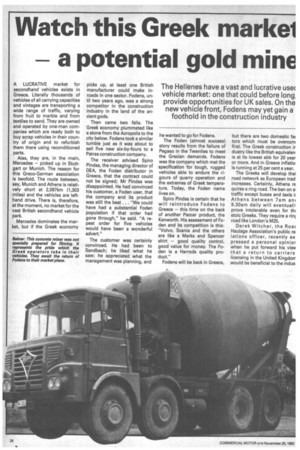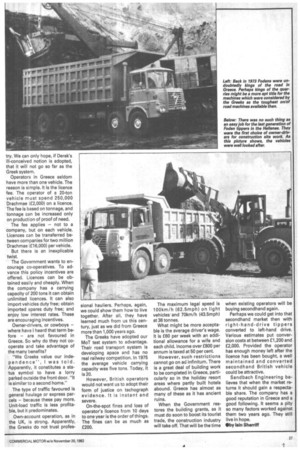Watch this Greek markei a potential gold mine
Page 20

Page 21

If you've noticed an error in this article please click here to report it so we can fix it.
The Hellenes have a vast and lucrative use( vehicle market: one that could before long, provide opportunities for UK sales. On the new vehicle front, Fodens may yet gain a foothold in the construction industry
A LUCRATIVE market for secondhand vehicles exists in Greece. Literally thousands of vehicles of all carrying capacities and vintages are transporting a wide range of traffic, varying from fruit to marble and from textiles to sand. They are owned and operated by one-man cornpanies which are ready both to buy scrap vehicles in their country of origin and to refurbish them there using reconditioned parts.
Alas, they are, in the main, Mercedes — picked up in Stuttgart or Munich. The reason for this Greco-German association is twofold. The route between, say, Munich and Athens is relatively short at 2,097km (1,303 miles) and the vehicles are lefthand drive. There is, therefore, at the moment, no market for the vast British secondhand vehicle park.
Mercedes dominates the market, but if the Greek economy picks up, at least one British manufacturer could make inroads in one sector. Fodens, until two years ago, was a strong competitor in the construction industry in the land of the ancient gods.
Then came two falls. The Greek economy plummeted like a stone from the Acropolis to the city below. Fodens took a similar tumble just as it was about to sell five new six-by-fours to a Patras construction company.
The receiver advised Spiro Pindas, the managing director of DEA, the Foden distributor in Greece, that the contract could not be signed; Mr Pindas was disappointed. He had convinced his customer, a Foden user, that the company and its product was still the best . . . "We could have had a substantial Foden population if that order had gone through," he said. "A repeat order for five vehicles would have been a wonderful advert."
The customer was certainly convinced. He had been to Sandbach; he liked what he saw; he appreciated what the management was planning, and he wanted to go for Fodens.
The Foden (almost success) story results from the failure of Pegaso in the Twenties to meet the Grecian demands. Fodens was the company which met the specification for tough, rugged vehicles able to endure the rigours of quarry operation and the extremes of Greek temperature. Today, the Foden name lives on.
Spiro Pindas is certain that he will reintroduce Fodens to Greece — this time on the back of another Paccar product, the Kenworth. His assessment of Foden and its competition is this: "Volvo, Scania and the others are like a Marks and Spencer shirt — good quality control, good value for money. The Foden is a Harrods quality product."
Fodens will be back in Greece,
but there are two domestic fa( tors which must be overcom first. The Greek construction ir dustry like the British equivalen. is at its lowest ebb for 20 year or more. And in Greece inflatiol is running at 25 per cent a year.
The Greeks will develop thei road network as European trad increases. Certainly, Athens re quires a ring road. The ban on al traffic except buses and taxis ii Athens between 7am an 9.30am daily will eventualll prove intolerable even for thi stoic Greeks. They require a rinc road like London's M25.
Derek Witcher, the Roac Haulage Association's public re lations officer, recently ex pressed a personal opinior when he put forward his viem that a return to carriers licensing in the United Kingdom would be beneficial to the indus. try. We can only hope, if Derek's ill-conceived notion is adopted, that it will not go so far as the Greek system.
Operators in Greece seldom have more than one vehicle. The reason is simple. It is the licence fee. The operator of a 20-ton vehicle must spend 250,000 Drachmae (£2,000) on a licence. The fee is based on tonnage, and tonnage can be increased only on production of proof of need.
The fee applies — not to a company, but on each vehicle. Licences can be transferred between companies for two million Drachmae (£16,000) per vehicle.
But there is an inexplicable twist.
The Government wants to encourage co-operatives. To advance this policy incentives are offered. Licences can be obtained easily and cheaply. When the company has a carrying capacity of 200 tons it can obtain unlimited licences. It can also import vehicles duty free; obtain imported spares duty free; and enjoy low interest rates. These are encouraging incentives.
Owner-drivers, or cowboys — where have I heard that term before — are not favoured in Greece. So why do they not cooperate and take advantage of the many benefits?
"We Greeks value our independence'', I was told. Apparently, it constitutes a status symbol to have a lorry parked outside the front door. "It is similar to a second home."
The type of traffic favoured is general haulage or express parcels — because these pay more. Unit-load traffic is less profitable, but it predominates.
Own-account operation, as in the UK, is strong. Apparently, the Greeks do not trust proles sional hauliers. Perhaps, again, we could show them how to live together. After all, they have learned much from us this century, just as we did from Greece more than 1,000 years ago.
The Greeks have adopted our MoT test system to advantage. Their road transport system is developing apace and has no real railway competition. In 1975 the average vehicle carrying capacity was five tons. Today, it is 20.
However, British operators would not want us to adopt their form of justice on tachograph evidence. It is instant and severe.
On-the-spot fines and loss of operator's licence from 10 days to one year is the order of things. The fines can be as much as £200. The maximum legal speed is 100km/h (62.5mph) on light vehicles and 70km/h (43.5mph) at 38 tonnes.
What might be more acceptable is the average driver's wage. It is £60 per week with an additional allowance for a wife and each child. Income over £800 per annum is taxed at 50 per cent.
However, such restrictions cannot go on ad infinitum. There is a great deal of building work to be completed in Greece, particularly so in the holiday resort areas where partly built hotels abound. Greece has almost as many of these as it has ancient ruins.
When the Government restores the building grants, as it must do soon to boost its tourist trade, the construction industry will take off. That will be the time when existing operators will be buying secondhand again.
Perhaps we could get into that secondhand market then with right-hand-drive tippers converted to left-hand drive. Various estimates put conversion costs at between £1,200 and £2,000. Provided the operator has enough money left after the licence has been bought, a well maintained and converted secondhand British vehicle could be attractive.
Sandbach Engineering believes that when the market returns it should gain a respectable share. The company has a good reputation in Greece and a good following. It seems a pity so many factors worked against them two years ago. They still live in hope.
fOby lain Sherriff












































